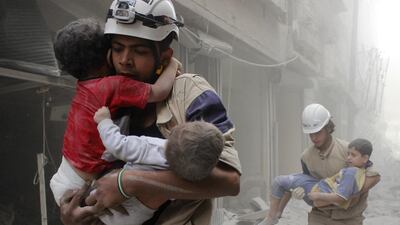The Syrian Civil Defence, commonly known as the White Helmets, has saved more than 60,000 lives and was nominated for the Nobel Peace Prize – a decision that was not applauded by Syrian president Bashar Al Assad.
Writing in The National's Arabic-language sister publication Aletihad, Dr Khales Jalabi commented on the short documentary The White Helmets released recently by the streaming service Netflix and filmed in Aleppo this year.
“In the film, they are seen with their white helmets and simple tools at hand. Whenever they hear the terrifying sound of aircraft over Aleppo, they stop what they are doing and rush to the targeted area for rescue,” he wrote.
One of their most notable rescue operations was saving a “miracle baby” stuck under rubble for 16 hours.
The White Helmets are united by their motto taken from the Quran: “Whoever saves a life, it is as though he has saved mankind entirely,” Jalabi noted.
He called them model citizens of Aleppo and quoted Abu Omar, a White Helmet in the film: “It does not matter who is fighting who. What matters is that I save those stuck under the rubble.”
These are rescuers with a humanitarian cause who risk their lives with every bombing and explosion. At the time of the release of the documentary, 132 rescuers had died. The figure now is about 150. But, Jalabi continued, 58,000 lives had been saved (it is now closer to 62,000).
Syrian columnist Fayez Sarah was not surprised that Mr Al Assad had downplayed the importance of the organisation's work.
"The White Helmets are thwarting his objective to kill more and more Syrians, and destroy their properties," he said in the pan-Arab daily Asharq Al Awsat.
Since its formation in 2013, the White Helmets have not discriminated in their work.
“Amid the armed conflict, the White Helmets have faced regime-led airstrikes on the one hand and sniper fire on the other to reach the bodies of regime soldiers and give them a proper burial,” Sarah wrote.
“They rely on primitive tools in their operations due to their limited funding. Nonetheless, they have added to their list of tasks the provision of public services to residents.”
He noted that they serve a total of seven million people.
The writer noted that dozens of White Helmets had been killed by air strikes that directly targeted their locations.
It was this heroic and difficult humanitarian work that was behind the group's nomination for the Nobel Peace Prize.
Sarah saw the White Helmets, their mission and their objectives as the clearest reflection of the spirit of Syrians. Their work embodies the revolution the Syrian people led against Mr Al Assad’s oppressive regime in 2011, when they called for freedom and joined forces to stop the killing, destruction and displacement by demanding a new political structure that ensured freedom and justice for all.
“While the organisation did not receive the Nobel Peace Prize, its image and voice have reached the world from a country that has become depicted by war and destruction,” he wrote.
Until that point, Syria was mostly known for the terrorists and extremists in Mr Al Assad’s regime and among its allies, not to mention ISIL, Al Qaeda and other extremist groups.
* Jennifer Attieh
translation@thenational.ae

